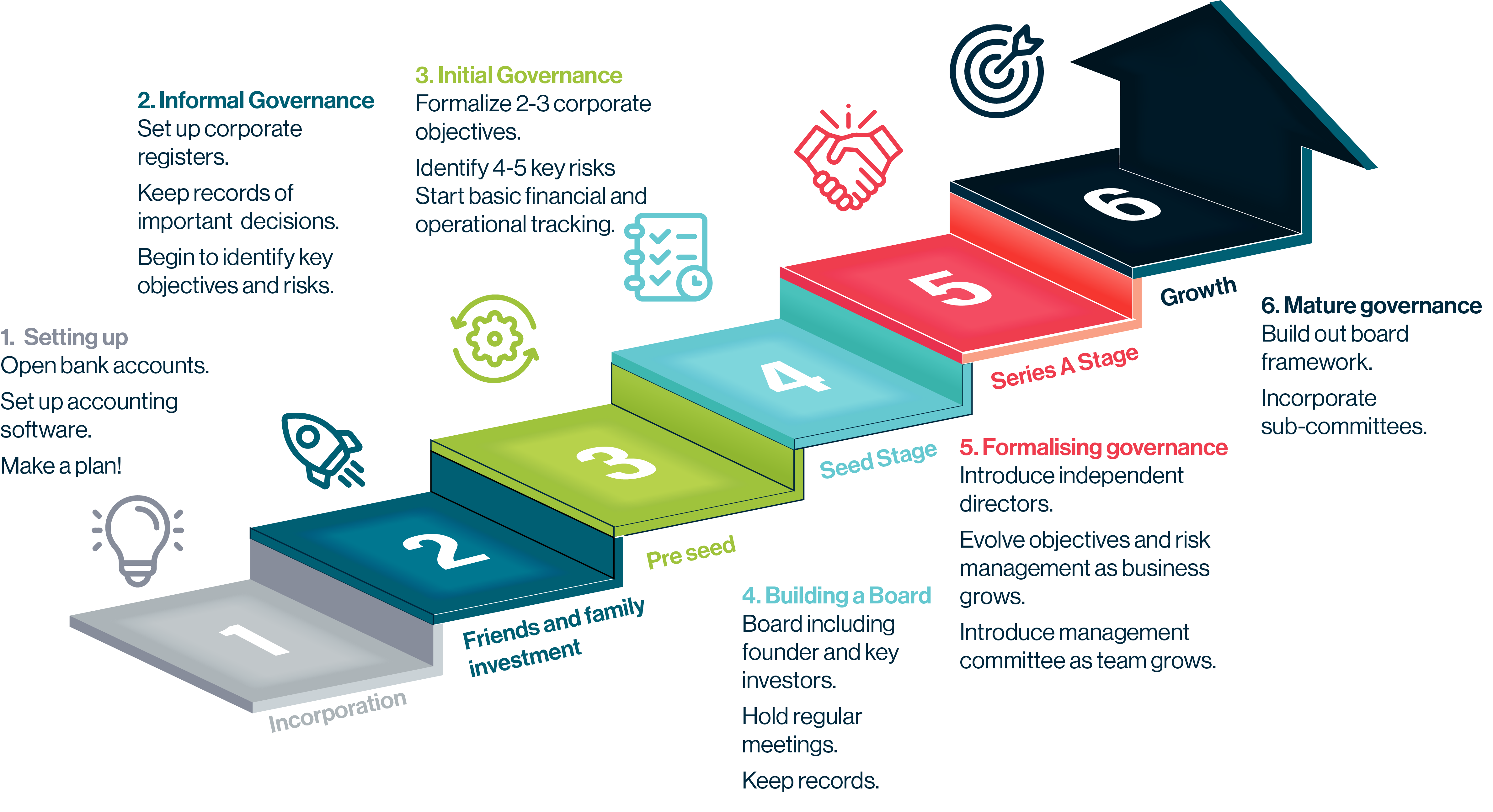When to Initiate Corporate Governance in Your Startup
Posted: August 20, 2024 // Author: Board Originator Ltd.

Corporate governance is essential for startups aiming for long-term success, yet it’s often overlooked or delayed by founders focused on product development and scaling. However, understanding when and how to implement corporate governance can prevent costly errors as your company grows.
Why Corporate Governance Matters
Corporate governance refers to the system of rules, practices, and processes by which a company is directed and controlled. It ensures responsible decision-making, risk management, and protection of stakeholder interests. For startups, implementing good governance early on builds trust with investors and lays the foundation for sustainable growth.
The Stages of Corporate Governance
Stage 1: Initial Incorporation (Foundation Stage)
Corporate governance begins as soon as you incorporate your startup. At this stage, it’s about laying the groundwork—establishing the legal structure, registering the company, and ensuring compliance with local regulations. Set up basic records and introduce a simple decision-making process to maintain order as you begin operations. Additionally, it’s crucial to set up business bank accounts and implement accounting software to track your finances from day one. Proper financial management is a cornerstone of good governance and will make future reporting much easier.
Stage 2: Friends and Family Investment (Informal Governance)
When you receive investment from friends and family, maintain informal records of decisions and finances. Transparency is key at this stage. Begin identifying key corporate objectives, such as product development or market entry, to keep your early investors informed and engaged.
Stage 3: Pre-Seed Stage (Initial Governance)
As you enter the pre-seed stage, it’s time to formalize governance slightly. Introduce 2-3 corporate objectives, such as launching the product or acquiring initial customers. Identify 4-5 key risks that could impact your startup, such as market acceptance or litigation risk (which can be mitigated with Directors and Officers (D&O) insurance). Maintain basic financial and operational tracking to ensure you’re on the right path.
Stage 4: Seed Stage (Building a Board)
During the seed stage, as you gain traction and bring on professional investors, it’s crucial to form a board of directors. Initially, this board may consist of just you and your key investors. Start holding regular board meetings to review progress and make strategic decisions. This governance framework, though still simple, will provide the oversight needed as you prepare for more significant growth.
Stage 5: Series A Stage (Advanced Governance Preparation)
As your startup approaches significant revenue milestones and prepares for a Series A round, it’s time to consider adding independent directors to your board. Independent directors bring valuable outside perspectives and help balance the interests of different stakeholders. At this stage, you should expand your corporate objectives and risk management practices to reflect your growing operations. Strengthen the governance framework in preparation for the scaling that will follow your Series A funding.
Stage 6: B Rounds and Beyond (Mature Governance)
Once you’ve secured B round funding and beyond, your company will be scaling rapidly, and advanced governance structures become essential. This includes implementing a fully developed board with independent members, regularly reviewing and updating corporate objectives and risks, and potentially incorporating sub-committees to focus on specific areas such as audit, strategy, or risk management. This mature governance structure ensures that your startup is well-prepared to handle the complexities of rapid growth and evolving market conditions.
Conclusion
Corporate governance might not be the most exciting part of building a startup, but it’s one of the most critical. Start light, with a few key objectives and risks, and gradually build a formal governance structure as you move through each stage of your startup’s lifecycle. Aligning governance with your company’s growth stages helps secure your startup’s success and prepares you for future challenges. Good governance isn’t just about compliance—it’s about steering your company toward long-term success with confidence and clarity.
Disclaimer
The blogs of Board Originator Ltd / SEEIO and any of its contractors, agents or employees are for the general interest of the readership only. We do not endorse any news or information we may publish in our blog. Our blog is not intended to and does not constitute legal or professional advice to any person or business. Our posts are general news items or updates that may interest our followers and consist of a brief overview therefore are incomplete on information and may contain errors at any time. Readers are not to rely on our blog content and those that do rely, do so at their own risk. We accept no responsibility to readers for our blog and we will not be held liable for statements in or third party links within our blogs. Any common law liability is also excluded as permitted by law. We do not accept any liability for damages whether direct, indirect, special, consequential or otherwise under any circumstances, whether foreseeable or otherwise. Please also see our extensive website terms and conditions in the footer of our website.